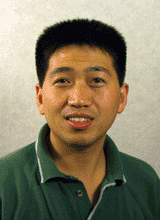Song-Hai Shi, a 2000 graduate of the joint Genetics Program at Cold Spring Harbor Laboratory and SUNY Stony Brook, is the winner of the 2001 Amersham Biosciences & Science Prize for work he carried out in the laboratory of CSHL neuroscientist Roberto Malinow. Shi received this prestigious award for young researchers at the Centennial Nobel Prize ceremony in Stockholm, Sweden, on December 5th. He was the Grand Prize Winner among a group of six finalists from Sweden, Germany, New York (2), Japan and Israel.
 Following an international search, the Amersham Biosciences & Science Prize is awarded each year for the most outstanding Ph.D. thesis among graduate students in molecular biology. The $25,000 prize, established in 1995 to support scientists at the beginning of their careers, includes publication of the winning essay describing their thesis research in Science. Shi’s essay on the molecular basis of memory—”AMPA receptor Dynamics and Synaptic Plasticity”—is published in the November 30th issue of Science.
Following an international search, the Amersham Biosciences & Science Prize is awarded each year for the most outstanding Ph.D. thesis among graduate students in molecular biology. The $25,000 prize, established in 1995 to support scientists at the beginning of their careers, includes publication of the winning essay describing their thesis research in Science. Shi’s essay on the molecular basis of memory—”AMPA receptor Dynamics and Synaptic Plasticity”—is published in the November 30th issue of Science.
“The prize is not only for me, but also for Cold Spring Harbor Laboratory and Stony Brook,” says Shi. “I was delighted when Robert invited me to join his laboratory for my thesis research. His work on mechanisms of long-term potentiation (LTP) fits my interest in learning and memory very well.” The three and a half years spent with Dr. Malinow were “a fruitful time for me,” says Shi, who published two papers in Science and one in Cell during that time. One of his articles was recognized as a “Breakthrough of the Year” by Science.
For more than 20 years, graduate students at SUNY Stony Brook have performed laboratory rotations and doctoral research at Cold Spring Harbor Laboratory and Brookhaven National Laboratory while performing course work at their home campus. At Cold Spring Harbor Laboratory the students also participate in a weekly seminar series that covers a rich variety of contemporary topics in genetics, molecular and cellular biology, and neurobiology irrespective of their chosen degree programs.
Shi was born in 1973 in a small village on the east coast of China. His parents are farmers and he recounts his poor but happy childhood, “I still remember the times my brother and I spent in the little river in front of our home catching fish.” After finishing middle school in his hometown, Shi attended Tsinghua University in Beijing, “a cradle for outstanding scholars and engineers” for nearly a century. It was during his five years at the garden-like campus that he learned Mathematics, Physics, Chemistry and Biology, critical steps toward his childhood dream of being a scientist.
With a grant from the Howard Hughes Medical Institute at the University of California in San Francisco. Dr. Shi is currently pursuing post-doctoral studies to further understand how our brains develop and function. Fondly recalling his days at Cold Spring Harbor Laboratory, Dr. Shi said, “I liked Cold Spring Harbor Laboratory because you can really concentrate there. Everything is very efficient. Who knows,” he said, “someday I might be back.”
Written by: Communications Department | publicaffairs@cshl.edu | 516-367-8455